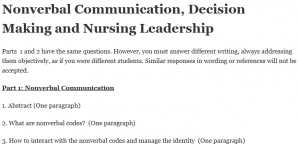Nonverbal Communication, Decision Making and Nursing Leadership

Parts 1 and 2 have the same questions. However, you must answer different writing, always addressing them objectively, as if you were different students. Similar responses in wording or references will not be accepted.
Part 1: Nonverbal Communication
1. Abstract (One paragraph)
2. What are nonverbal codes? (One paragraph)
3. How to interact with the nonverbal codes and manage the identity (One paragraph)
4. What nonverbal codes do you use to manage your identity? (write in the first person- One paragraph)
Part 2: Nonverbal Communication
1. Abstract (One paragraph)
2. What are nonverbal codes? (One paragraph)
3. How to interact with the nonverbal codes and manage the identity (One paragraph)
4. What nonverbal codes do you use to manage your identity? (write in the first person- One paragraph)
Parts 3, 4 and 5 have the same questions. However, you must answer with references and different writing, always addressing them objectively, as if you were different students. Similar responses in wording or references will not be accepted.
Part 3: Decision Making
Five paragraphs per page
Watch another nurse in practice for 5 minutes. Take a snapshot in your mind and walk through the 5 Ws (Who, What, Where, Why, When (and How)?) using the questions earlier and discuss your findings.
1. What does this tell you about values?
2. What does it tell you about relating?
a. What is the purpose
b. What goals are being pursued
c. Whose interests are in the foreground?
3. What is happening simultaneously? For example, is the nurse relating effectively while also doing care tasks?
4. Does this serve as a model for your own relational practice? In what ways?
5. In what ways would you have acted differently to promote health and well-being?
Part 4: Decision Making
Five paragraphs per page
Watch another nurse in practice for 5 minutes. Take a snapshot in your mind and walk through the 5 Ws (Who, What, Where, Why, When (and How)?) using the questions earlier and discuss your findings.
1. What does this tell you about values?
2. What does it tell you about relating?
a. What is the purpose
b. What goals are being pursued
c. Whose interests are in the foreground?
3. What is happening simultaneously? For example, is the nurse relating effectively while also doing care tasks?
4. Does this serve as a model for your own relational practice? In what ways?
5. In what ways would you have acted differently to promote health and well-being?
Part 5: Decision Making
Five paragraphs per page
Watch another nurse in practice for 5 minutes. Take a snapshot in your mind and walk through the 5 Ws (Who, What, Where, Why, When (and How)?) using the questions earlier and discuss your findings
1. What does this tell you about values?
2. What does it tell you about relating?
a. What is the purpose
b. What goals are being pursued
c. Whose interests are in the foreground?
3. What is happening simultaneously? For example, is the nurse relating effectively while also doing care tasks?
4. Does this serve as a model for your own relational practice? In what ways?
5. In what ways would you have acted differently to promote health and well-being?
Parts 6, 7 and 8 have the same questions. However, you must answer with references and different writing, always addressing them objectively, as if you were different students. Similar responses in wording or references will not be accepted.
Part 6: Nursing Leadership
Many people have problems with changes. Nurses need to deal with changes every day.
1. How do you deal with changes? (Two paragraphs)
2. Tell me three good reasons for changes? (one paragraph)
Part 7: Nursing Leadership
Many people have problems with changes. Nurses need to deal with changes every day.
1. How do you deal with changes? (Two paragraphs)
2. Tell me three good reasons for changes? (one paragraph)
Part 8: Nursing Leadership
Many people have problems with changes. Nurses need to deal with changes every day.
1. How do you deal with changes? (Two paragraphs)
2. Tell me three good reasons for changes? (one paragraph)